- Home
- Paulo Coelho
Veronika Decides to Die: A Novel of Redemption Page 17
Veronika Decides to Die: A Novel of Redemption Read online
Page 17
There are some battles in life that have only two possible outcomes: they either destroy us or they make us strong. The psychiatric hospital was one such battle.
Talking to another patient one night, I said: "You know, I think nearly everyone at some point in his life has dreamed of being president of the republic. But neither you nor I can ever aspire to that because of our medical records."
"Then we've got nothing to lose," said the other man. "We can just do whatever we want to do."
It seemed to me he was right. The situation I found myself in was so strange, so extreme, that it brought with it something unprecedented: total freedom. All my family's efforts to make me the same as everyone else had exactly the opposite result; I was now completely different from all the other young men my age.
That same night I considered my future. One option was to become a writer; the other, which seemed more viable, was to go properly mad. I would be supported by the state and would never have to work or take on any responsibility. I would of course have to spend a great deal of time in mental institutions, but I knew from my own experience that patients there do not behave like the mad people you see in Hollywood films. Apart from a few pathological cases of catatonia or schizophrenia, all the patients were perfectly capable of talking about life and had their own highly original ideas on the subject. Every now and then they would suffer panic attacks or bouts of depression or aggression, but these did not last.
The greatest risk I ran in the hospital was not of losing all hope of ever becoming president of the republic, or of feeling marginalized and unfairly treated by my family--because in my heart I knew that having me admitted to the hospital was a desperate act of love and overprotectiveness on their part. The greatest risk I ran was of coming to think of that situation as normal.
When I came out of the hospital for the third time--after the usual cycle of escaping from the hospital/traveling around/going back home/enjoying a honeymoon period with my family/getting into bad company again/being readmitted into the hospital--I was nearly twenty and had become accustomed to that rhythm of events. This time, however, something had changed.
Although I again got into "bad company," my parents were growing reluctant to have me readmitted to a mental hospital. Unbeknown to me they were by then convinced that I was a hopeless case, and preferred to keep me with them and support me for the rest of my life.
My behavior went from bad to worse. I became more aggressive, but still there was no mention of the hospital. I experienced a period of great joy as I tried to exercise my so-called freedom in order to finally live the "artist's life." I left the new job my parents had found for me, stopped studying, and dedicated myself exclusively to the theater and to frequenting bars favored by intellectuals. For one long year I did exactly as I pleased. But then the theater group was broken up by the political police, the bars became infiltrated by spies, my stories were rejected by every publisher to which I sent them, and none of the girls I knew wanted to go out with me because I was a young man without a future, with no real career, and who had never even been to college.
So one day I decided to trash my bedroom. It was a way of saying, without words: "You see, I can't live in the real world. I can't get a job. I can't realize my dream. I think you're absolutely right. I am mad, and I want to go back to the mental hospital!"
Fate can be so ironic. When I had finished wrecking my room I was relieved to see that my parents were phoning the psychiatric hospital. However, the doctor who usually dealt with me was on vacation. The nurses arrived with a junior doctor in tow. He saw me sitting there surrounded by torn-up books, broken records, and ripped curtains, and asked my family and the nurses to leave the room.
"What's going on?" he asked.
I didn't reply. A madman should always behave like someone not of this world.
"Stop playing around," he said. "I've been reading your case history. You're not mad at all and I won't admit you to the hospital."
He left the room, wrote a prescription for some tranquillizers, and (I found out later) told my parents that I was suffering from "admission syndrome." Normal people who at some point find themselves in an abnormal situation--such as depression, panic, etc.--occasionally use illness as an alternative to life. That is, they choose to be ill because being "normal" is too much like hard work. My parents listened to his advice and never again had me admitted to a mental institution.
From then on I could no longer seek comfort in madness. I had to lick my wounds alone. I had to lose some battles and win others. I often had to abandon my impossible dream and work in offices instead, until one day I gave it all up for the nth time and I went on a pilgrimage to Santiago de Compostela. There I realized that I could not keep refusing to face up to the fate of "being an artist," which in my case meant being a writer. So at thirty-eight I decided to write my first book and risk entering into a battle which I had always subconsciously feared: the battle for a dream.
I found a publisher and that first book (The Pilgrimage, about my experience on the Road to Santiago) led me to The Alchemist, which led me to other books, which led to translations, which led to lectures and conferences all over the world. Although I kept postponing my dream, I realized that I could do so no longer, and that the universe always favors those who fight for what they want.
After an exhausting 1997 promotional tour across three continents, I began to notice a very odd phenomenon: what I wanted on that day when I trashed my bedroom seemed to be something a lot of other people wanted too. People preferred to live in a huge asylum religiously following rules written by who knows who, rather than fighting for the right to be different. On a flight to Tokyo I read the following in a newspaper:
According to Statistics Canada, forty percent of people between fifteen and thirty-four, thirty-three percent of people between thirty-five and fifty-four, and twenty percent of people between fifty-five and sixty-four have already had some kind of mental illness. It is thought that one in every five individuals suffers from some form of psychiatric disorder.
I thought: Canada has never had a military dictatorship and it's considered to have the best quality of life in the world. Why then are there so many mad people there? Why aren't they in mental hospitals?
That question led me to another: what exactly is madness?
I found the answers to both those questions. First, people aren't placed in mental institutions if they continue to be socially productive. If you are capable of getting to work at 9:00 A.M. and staying until 5:00 P.M., then society does not consider you incapacitated. It doesn't matter if you sit in a catatonic state in front of the television from 5:01 P.M. until 8:59 A.M. You may indulge in the most perverted sexual fantasies on the Internet, stare at the wall blaming the world for everything and feeling generally put upon, feel afraid to go out into the street, be obsessed with cleanliness or a lack of cleanliness, or suffer from bouts of depression and compulsive crying. As long as you can turn up for work and do your bit for society you don't represent a threat. You're only a threat when the cup finally overflows and you go out into the street with a machine gun in your hand, like a character in a child's cartoon, and kill fifteen children in order to alert the world to the pernicious effects of Tom and Jerry. Until you do that you are deemed normal.
And madness? Madness is the inability to communicate.
Between normality and madness, which are basically the same thing, there exists an intermediary stage: it is called "being different." And people were becoming more and more afraid of "being different." In Japan, after giving much thought to the statistical information I had just read, I decided to write a book based on my own experiences. I wrote Veronika Decides to Die in the third person and using my feminine ego because I knew that the important subject to be addressed was not what I had personally experienced in mental institutions, but rather the risks we run by being different and, conversely, our horror of being the same.
When I finished I went and talked to my father.
Once the difficult time of my adolescence and early youth was over, my parents never forgave themselves for what they did to me. I always told them that it really hadn't been that bad and that prison (for I was imprisoned three times for political reasons) had left far deeper scars, but my parents refused to believe me and spent the rest of their lives blaming themselves.
"I've written a book about a mental institution," I said to my eighty-five-year-old father. "It's a fictional work, but there are a couple of pages where I speak as myself. It means going public about the time I spent in mental hospitals."
My father looked me in the eye and said: "Are you sure it won't harm you in any way?"
"Yes, I'm sure."
"Then go ahead. I'm tired of secrets."
Veronika Decides to Die came out in Brazil in August 1998. By September I had received more than twelve hundred e-mails and letters relating similar experiences. In October, some of the themes touched on in the book--depression, panic attacks, suicide--were discussed in a seminar that had national repercussions. On January 22, 1999, Senator Eduardo Suplicy read passages from my book aloud to other senators and managed to win approval for a law forbidding arbitrary admissions into mental institutions they had been trying to get through the Brazilian Congress for the last ten years.
This essay originally appeared in The Sunday Telegraph Review (London), (c) 1999 by Paulo Coelho.
About the Author
PAULO COELHO is one of the most beloved writers of our time. With sales of more than 75 million copies worldwide, his books have been translated into 61 languages and published in 150 countries. He is the recipient of numerous prestigious international awards, and was inducted into the Brazilian Academy of Letters in 2002. Mr. Coelho also writes a weekly column syndicated throughout the world.
www.paulocoelho.com and www.paulocoelhobooks.com
Visit www.AuthorTracker.com for exclusive information on your favorite HarperCollins author.
About the Publisher
Australia HarperCollins Publishers (Australia) Pty. Ltd.
25 Ryde Road (PO Box 321)
Pymble, NSW 2073, Australia https://www.harpercollinsebooks.com.au
Canada
HarperCollins Publishers Ltd.
2 Bloor Street East - 20th Floor Toronto, ON, M4W 1A8, Canada https://www.harpercollinsebooks.ca
New Zealand HarperCollinsPublishers (New Zealand) Limited P.O. Box 1
Auckland, New Zealand
https://www.harpercollinsebooks.co.nz
United Kingdom HarperCollins Publishers Ltd.
77-85 Fulham Palace Road
London, W6 8JB, UK
https://www.harpercollinsebooks.co.uk
United States HarperCollins Publishers Inc.
10 East 53rd Street
New York, NY 10022
https://www.harpercollinsebooks.com

 The Alchemist
The Alchemist Maktub
Maktub Like the Flowing River
Like the Flowing River The Winner Stands Alone
The Winner Stands Alone The Spy
The Spy By the River Piedra I Sat Down and Wept: A Novel of Forgiveness
By the River Piedra I Sat Down and Wept: A Novel of Forgiveness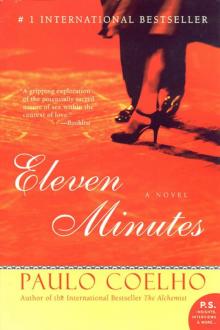 Eleven Minutes
Eleven Minutes Manuscript Found in Accra
Manuscript Found in Accra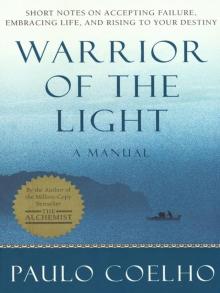 Warrior of the Light
Warrior of the Light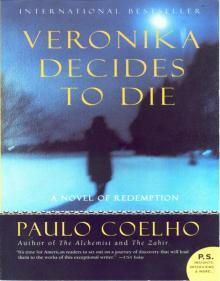 Veronika Decides to Die: A Novel of Redemption
Veronika Decides to Die: A Novel of Redemption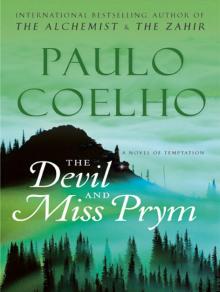 The Devil and Miss Prym: A Novel of Temptation
The Devil and Miss Prym: A Novel of Temptation The Valkyries: An Encounter With Angels
The Valkyries: An Encounter With Angels Brida: A Novel
Brida: A Novel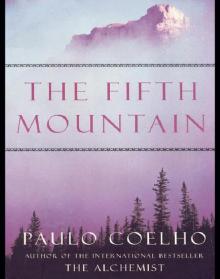 Fifth Mountain: A Novel
Fifth Mountain: A Novel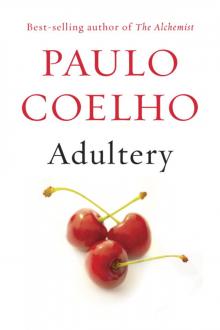 Adultery
Adultery Inspirations
Inspirations The Archer
The Archer The Witch of Portobello
The Witch of Portobello The Pilgrimage
The Pilgrimage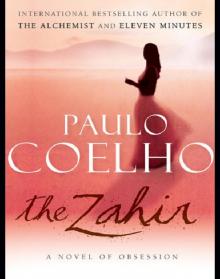 The Zahir
The Zahir Brida
Brida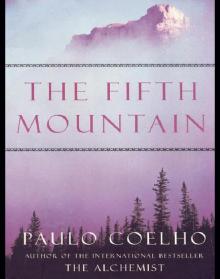 The Fifth Mountain
The Fifth Mountain Like the Flowing River: Thoughts and Reflections
Like the Flowing River: Thoughts and Reflections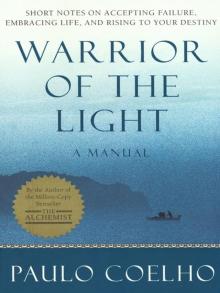 Manual of the Warrior of Light
Manual of the Warrior of Light By The River Piedra I Sat Down & Wept
By The River Piedra I Sat Down & Wept The Supreme Gift
The Supreme Gift Aleph
Aleph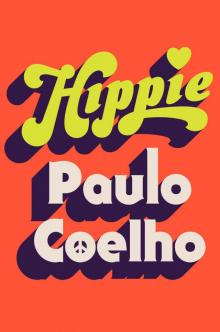 Hippie
Hippie Witch of Portobello
Witch of Portobello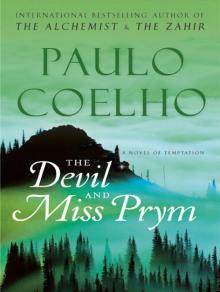 The Devil and Miss Prym
The Devil and Miss Prym The Alchemist - 10th Anniversary Edition
The Alchemist - 10th Anniversary Edition The Valkyries
The Valkyries